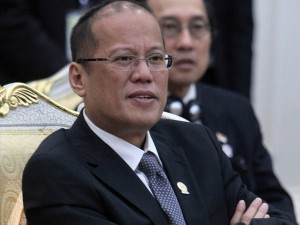President Aquino and Chinese President Hu Jintao will likely discuss the West Philippine Sea (South China Sea) territorial row on the sidelines of the Asia-Pacific Economic Cooperation (Apec) leaders’ summit in Russia next week, officials said Wednesday.
“I’m sure it will be raised by the other side. The Philippines will not raise it,” Foreign Undersecretary Laura del Rosario said at a news briefing in Malacañang.
She said the Chinese side had proposed the bilateral meeting, and Mr. Aquino would accept.
“It will be No. 1 on his priority list,” she said.
Mr. Aquino and Hu will attend the Apec leaders’ summit in Russia’s far eastern port city of Vladivostok on September 8 and 9.
It will be the two leaders’ first meeting since Mr. Aquino’s visit to China in August 2011 and four months since a maritime standoff between the Philippines and China at Panatag Shoal (Scarborough Shoal) in the West Philippine Sea.
US President Barack Obama is skipping the summit, but US Secretary of State Hillary Clinton will attend it to represent the United States, which has said it has a national interest in the stability and freedom of navigation in the West Philippine Sea.
Should Mr. Hu raise the issue, Mr. Aquino would “explain to them what we’re doing to deescalate it” and reiterate the need to maintain economic relations, Del Rosario said.
“The President will explain our position and what we’re trying to do,” she added.
Presidential spokesperson Edwin Lacierda said the summit would be a good opportunity for the Philippine and Chinese leaders to speak to each other about “issues of mutual concern.”
Del Rosario said the meeting between Mr. Aquino and Hu on the sidelines of the summit had not yet been confirmed, with both the delegations still to make their final schedules.
Separate from economics
Del Rosario emphasized the Philippines wanted to focus on boosting economic partnerships with China during the planned meeting, not the West Philippine Sea dispute that has caused deep diplomatic fissures for more than a year.
“We just hope … that whatever political issues we have, we can just separate it from economic issues and trade issues,” she said.
And if that is possible, the agenda for the meeting will be reinvigorating trade between the two countries, Del Rosario said.
“It will be more like assuring each other that they should go back to the starting point when everything was fine,” she said.
“I don’t want to second-guess the President of China. If you look at the premise of diplomatic relations, it’s basically maintaining the status quo of peace.”
Panatag standoff
Tensions between the Philippines and China over Panatag Shoal remain, with Chinese vessels refusing to leave the reef even after the end of the standoff in mid-June.
Manila is seeking a diplomatic, legal and political solution to the dispute, which began in April with Chinese maritime vessels blocking Philippine law-enforcement ships to prevent the arrest of Chinese fishermen caught poaching sharks and harvesting rare clams and corals in the shoal’s lagoon.
Beijing claims sovereignty over nearly all of the West Philippine Sea, which is believed to hold vast amounts of oil and gas, is a rich fishing ground for the region and is home to sea-lanes that are vital to global trade.
But the Philippines, Brunei, Malaysia and Vietnam, as well as Taiwan, claim parts of the sea.
The Philippines and Vietnam have accused China of becoming increasingly aggressive in staking its claims to the area.
Neighborhood bully
Foreign Secretary Albert del Rosario called China the neighborhood bully. Lecturing at Ateneo de Manila University Wednesday, Del Rosario said that at some point during the standoff, China sent 90 ships to face off with two Philippine vessels.
“Is that called a bully?” Del Rosario asked his audience of 6th graders.
“Yes,” some 500 students responded.
“Imagine, it’s like a neighborhood bully coming to our backyard and is kicking us out of our own property,” Del Rosario said.
In Malacañang, Undersecretary Del Rosario acknowledged that resolving the dispute would take years.
“We cannot expect this to be solved within the next few years,” she said.
“[Just look] at the [Japan-China] problem,” she added, referring to a similar territorial dispute in the East China Sea.
“But we just have to look at what we call a modus vivendi, you know, a way for us to live together and maintain our own equanimity and our own balance when looking at our relations and not let political issues get in the way of our economic relations.”
Apec agenda
President Aquino is scheduled to leave on September 7 to join world and economic leaders from the 21 Apec member countries for the regional group’s 20th meeting on Vladivostok’s Russky Island on September 8 and 9.
Topping the Apec meeting’s agenda are trade and liberalization, and regional economic integration; strengthening food security; establishing reliable supply chains; and cooperation to foster innovative growth.
Apec countries account for 40 percent of the world’s population, approximately 54 percent of the world’s gross domestic product and about 44 percent of world trade.
Mr. Aquino will address the Apec Business Advisory Council (Abac) Dialogue with Leaders. Besides meeting Hu, he will meet with the leaders of Japan, Singapore and Chile before flying back to Manila on September 9.
A lean Philippine delegation, including Foreign Secretary Albert del Rosario, Trade Secretary Gregory Domingo and Finance Secretary Cesar Purisima, will join the President in the meeting.
After the turn of Indonesia next year and China in 2014, the Philippines will host the Apec leaders’ meeting in 2015. Undersecretary Del Rosario said the Cabinet would choose the venue of the meeting. Tarra Quismundo
Originally posted at 09:46 pm | Wednesday, August 29, 2012
